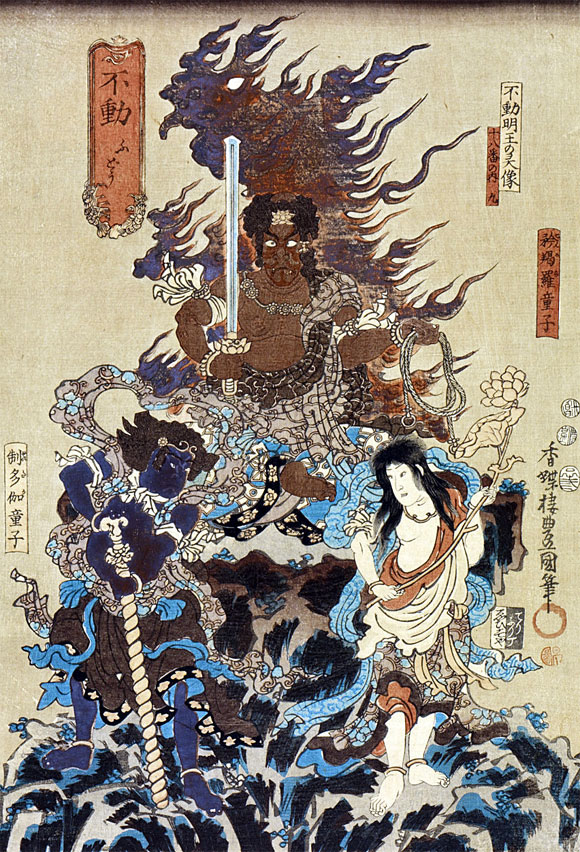| FUDď |
| Play title | Tsuwamono Kongen Soga |
|||||||||||||||
| Common title | Fud˘ |
|||||||||||||||
| Authors | Tsuuchi Hanjűr˘/Yasuda Abun/Nakata Mansuke (1742) | |||||||||||||||
| History |
The first version of "Fud˘" was staged in the 5th lunar month of 1697 at the Nakamuraza, within the drama "Tsuwamono Kongen Soga". The role of the deity Fud˘ My˘˘ was played by Ichikawa Kuz˘ I. It was staged in the 4th lunar month of 1703 at the Moritaza in the drama "Naritasan Bunshin Fud˘" with Ichikawa Kuz˘ I in the role of the deity Fud˘ My˘˘ [illustration]. It also became the finale of "Narukami Fud˘ Kitayama Zakura" in the 1st lunar month of 1742 in ďsaka at the ďnishi no Shibai [casting], starring Ichikawa Ebiz˘ II in the leading role of the deity Fud˘ My˘˘. This role was transmitted from generation to generation up to Ichikawa Ebiz˘ V, who added it to his Kabuki Jűhachiban in 1840. It is nowadays staged as the finale of a t˘shi ky˘gen production of "Narukami Fud˘ Kitayama Zakura". During the 20th century, "Fud˘" was staged as an independent drama 4 times:
|
|||||||||||||||
| Key words |
Aragoto Chűnagon Fud˘ My˘˘ Jidaimono Jitsuaku Kabuki Jűhachiban Kar˘ Koshimoto Onmy˘ji ďzatsuma Shinreigoto Sh˘ya Yakko |
|||||||||||||||
| Summary |
Hayakumo Daijin, a high-ranking nobleman, plots to take over the court and rule the empire of the rising sun (the quintessence of jitsuaku!). He also devotes himself to lascivious pleasures with concubines or courtesans. One of his favorite courtesans, a beauty named Chitoseya Miyoshino, comes to his mansion to visit him. In reality, she is on the side of Hayakumo's enemies and she has come to see whether she can retrieve a sacred mirror, one of the symbols of the ruler of the country, which has been stolen by Hayakumo. She makes a show of complying with Hayakumo's amorous advances but the evil lord is not fooled. He pretends to be pleased with Miyoshino's love games but he stays on his guard. The coming of Lord Sakuramachi Kiyofusa, who has the chűnagon rank, is announced. As Hayakumo is not to be disturbed in his love affair with Miyoshino, his brother Hayakumo Tokikaze receives Sakuramachi along with the kar˘ Hata no Minbu, who is at the service of the Ono clan. Sakuramachi has come to denounce Hayakumo as a liar who committed an unforgivable fraud! Several months before, a drought prevailed throughout Japan. Not even a drop of rain was to be seen. The farmers, suffering terribly from the drought, flocked to the court for relief. Hayakumo has sent to the court a magic poem card which he has vowed would break the draught if a certain ritual were carried out with it. Sakuramachi says that the supposedly magical card is a fake. Tokikaze asks what could have been the root cause of the long rain of three days and nights, which has successfully broken the draught. Sakuramachi answers that the rain was not the result of Hayakumo's poem card's magic, but has fallen because the courageous Princess Taema has seduced the evil priest Narukami and broken his terrible spell. Hearing about the failure of Narukami, who was an ally for his brother, Tokikaze finds that the problem is more than he can handle himself. He goes to fetch his elder brother. In the meantime, the koshimoto Tsuruha and the yakko Kiyohei are seen conversing together. They are in reality Kumedera Danj˘'s sister Matsugae and the onmy˘ji Abe no Kiyotsura, both of whom are spies in Hayakumo's mansion working for the court side. The exhort each other, saying that their time has come to act. Then, they exit the stage. Hayakumo appears on stage with Miyoshino. The box containing the poem-card has been delivered to him by his brother. Hayakumo angrily kicks the box away, at which movement a small brocade-wrapped object drops out of his bosom. Miyoshino quickly picks it up, recognizing it as the sacred mirror she is looking for. Watching her, Hayakumo realizes that his suspicions were only too true. He tries to take the sacred mirror back, but he is confronted by Hata no Minbu. Learning that his secret has been discovered by spies in his household, Hayakumo defiantly reveals his true identity and his diabolical intentions. Suddenly Matsugae and Kiyotsura reappear on stage and confront Hayakumo. They are with a group of warriors carrying spears and dashing in to surround Hayakumo. When Hayakumo glares at them and spits fire at them, the warriors have to quickly retreat in order to avoid death. Miyoshino, Minbu, Matsugae and Kiyotsura all fall in a faint to the floor. Hayakumo disappears behind a screen. Presently a strange light glows from beyond the screen, and the ferocious figure of the powerful Fud˘ My˘˘ appears on stage, his sword right into the villain's breast, ready to give the death blow. The four valiant heroes regain consciousness and are amazed to find that they are no longer in the mansion but near the ravine of Kurama near Ky˘to. Fud˘ My˘˘, who has faded from sight a little previously, begins to glow again. Farmers, led by their sh˘ya and his daughter Otsumi, throng by, saying thanks to their guardian god for the saving rain and the end of Hayakumo's career of evil! |
 |
|
The actor Ichikawa Ebiz˘ V (top/center) playing the role of the deity Fud˘ My˘˘ in the drama "Fud˘" in a mitate-e print made in 1852 by Utagawa Toyokuni III |
|
|
| Contact | Main | Top | Updates | Actors | Plays | Playwrights | Programs | Links | FAQ | Glossary | Chronology | Illustrations | Prints | Characters | Derivatives | Theaters | Coming soon | News |